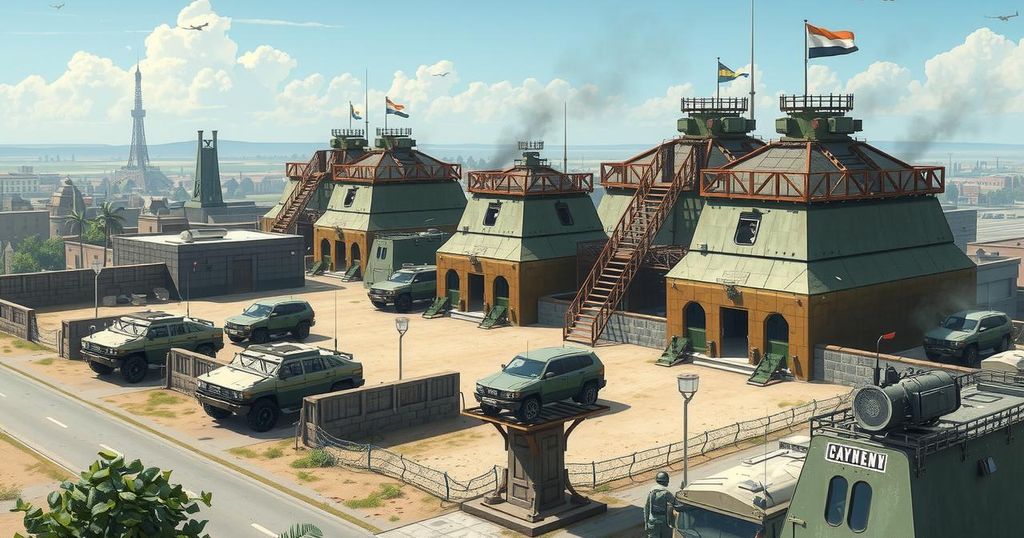World news
ABD, ABDEL FATTAH AL BURHAN, AFRICA, AL MUQRAN, BAHRI, BANK, BLUE NILE, CHINESE, CIVIL WAR, CONFLICT, CORINTHIA, CORINTHIA HOTEL, DAGAL, DARFUR, EGYPT, FRIENDSHIP HALL, KHARTOUM, MEDITERRANEAN, MILITARY, NATIONAL INTELLIGENCE SERVICE, NATIONAL MUSEUM, NILE, OM, OMDURMAN, RAPID SUPPORT FORCES, REFUGEE CRISIS, RSF, SUDAN, TUTI ISLAND, WAR
Fatima Alavi
0 Comments
Sudan’s Army Strengthens Control in Khartoum Amid Ongoing Conflict
Sudan’s army has regained control of essential sites in Khartoum, including the central bank and the presidential palace, after conflict with the Rapid Support Forces. Army chief General Al Burhan continues to push for total defeat of the RSF, rejecting negotiations. Despite territorial gains, humanitarian crises widen as violence persists, with future focus needed on Darfur and Kordofan.
The Sudanese army has successfully regained significant control over key sites in the capital, Khartoum, including the central bank and various crucial government buildings. This resurgence follows the recapture of the presidential palace and includes the expulsion of the paramilitary Rapid Support Forces (RSF) from notable locations such as the National Museum and the Friendship Hall. Notably, Tuti Island, situated on the Blue Nile, has also been regained.
These military successes signal a reversal of recent territorial losses suffered by the army after the RSF initially seized control of vital areas, including the international airport. Despite these gains, the RSF continues to hold the airport and numerous residential districts within the greater capital region. Online footage purportedly demonstrates soldiers celebrating their victories at various retaken sites in the Al Muqran area, a strategic point where the Blue and White Nile converge.
General Abdel Fattah Al Burhan, the army chief and de facto president, has committed to continuing the offensive against the RSF, expressing a strong determination to conclude the conflict decisively. He stated, “We are all determined to finish off this mutiny and eliminate those criminals and murderers,” rejecting any negotiation efforts to end the violence, emphasizing the sacrifices already made.
Previous ceasefires mediated by Saudi Arabia and the United States failed to stop the ongoing conflict, which has resulted in extensive humanitarian crises in Sudan, with millions displaced and millions more facing severe hunger. The hostilities erupted due to a power struggle between General Al Burhan and RSF commander General Mohamed Dagalo, once allies but now adversaries. As the army attempts to solidify its control over Khartoum, focus will likely shift to territories in Darfur and Kordofan that remain under RSF influence.
Salah Mansour, a military analyst, remarked on the situation, stating, “The war may have entered the countdown stage now, but it’s not over yet.” He further explained the need for the army to eliminate remaining RSF strongholds in Khartoum before addressing the situation in Darfur and Kordofan, predicting that while the RSF has been significantly weakened, they may still persist in warfare using urban tactics.
In summary, the Sudanese army’s recent territorial gains in Khartoum highlight an ongoing power struggle with the RSF. General Al Burhan’s commitment to eliminating RSF holds implications for the region’s future stability. However, the humanitarian repercussions of the conflict continue to escalate, demanding urgent attention. As the army regains control, the focus must also extend to restoring peace in Darfur and Kordofan, where RSF influence persists.
Original Source: www.thenationalnews.com




Post Comment